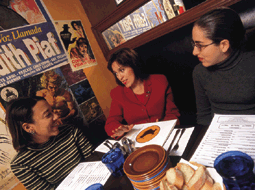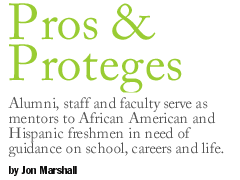

|
 |
 |
| Enjoying dinner at a tapas restaurant in Evanston are, from left, freshman Regina Robinson, mento Betty Olivera and freshman Michelle Noda. |
Jo'Von Hardy struggled through her first quarter at Northwestern.
Her grades were sinking, her motivation lagging and her campus
social life going nowhere. As a black student, Hardy says she found
it hard to adjust to a predominantly white school. Then Hardy met her alumnus mentor, David C. Hinton (McC95), a process engineer at LTV Steel Co. in East Chicago, Ind. Through the University's Mentoring Program for African American and Hispanic Freshmen, Hinton took Hardy and fellow freshman Pharoah Mathis under his wing last year. He called and e-mailed them up to three times a week, took them out bowling and to dinner, and gave them advice on classes, careers and relationships. "He kept in contact with me and motivated me," says Hardy, now a sophomore environmental engineering major. "It brought all my grades up at least a letter." Last summer, Hinton found Hardy a job in LTV's wastewater treatment plant. "I loved it," she says. "It made me realize environmental engineering is for me." This year, more than 100 minority Northwestern alumni like Hinton are helping black and Latino freshmen make the transition from high school to college and figure out future career paths. These mentors advise students on which classes to take, teach them the value of networking and offer them a friendly ear of someone who has gone through similar experiences. "We are resources for these students," says Cook County Circuit Court Judge Ronald C. Riley (SESP71, L76). "We're somebody they can talk to who may have experiences that can be helpful. When they need us, we're there for them." Among these professionals' ranks are doctors, business leaders, reporters, judges, psychologists, teachers, television producers, chemists and actors. The program tries to match students and alumni by their career and academic interests and by gender, race and ethnic background. Margaret J. Barr, vice president for student affairs, and Joyce A. Jones, former assistant vice president for student affairs, launched the program in 1994. At the time, concern was growing on campus that the University wasn't attracting and retaining enough minority students. Since its start, the number of freshmen participating in the mentoring program has soared from 12 to 112. More than 70 percent of African American and 31 percent of Hispanic freshmen are taking part this year. Alumni have also responded with enthusiasm. "We called and said we wanted to do this, will you help? And everyone said yes," Barr says. This year, more than 125 alumni volunteered to act as mentors. Each year, the program begins with a reception during New Student Week and concludes with an end-of-the-year celebration. In between, mentors are expected to get together with their protégés at least three times during the school year, says Mary K. Desler, assistant vice president for student affairs and coordinator of the program. They can take them out for lunch or dinner, join them for football games, concerts or plays on campus, or bring them to their workplaces. Last year, Marion Macbeth-Kelley (WCAS73) took her student to Chicago's Field Museum and out to dinner. This year, she's taking her protégé out shopping to get a winter coat. "I try to be accessible to what their needs are," says Kelley, a mathematics teacher at Evanston Township High School. In addition to offering friendship, alumni mentors help students develop career options. Last year, Andrik Cardenas, who is studying mechanical engineering, gained entrée into the engineering world through his alumni mentor, José Eguiguren (WCAS87). Eguiguren invited Cardenas to see his workplace at Ricardo Inc., an engineering consulting company in Burr Ridge, Ill., and showed him the company's engine modeling software. Eguiguren also invited Cardenas and other engineering students to attend meetings and lectures of the Chicago chapter of the Society of Automotive Engineers. "It was really an eye-opening experience," Cardenas recalls. Eguiguren makes a point of showing his students around Chicago, especially Latino neighborhoods like Pilsen and Humboldt Park and other areas most visitors don't see. "[The tour] helped me feel like I have a sense of how I can fit into the Chicago community," Cardenas says. "It showed me a lot about the city and its diversity and culture." For many freshmen, alumni mentors become their link to the broader metropolitan community. "I don't have any family here and had never been to Chicago before," says Aurin Squire, a sophomore radio, television and film major from Miami, who was paired with George de Lama (J79), the Chicago Tribune's associate managing editor for foreign and national news. Every other Saturday during the school year, de Lama took Squire with him to volunteer at the Robert R. McCormick Boys and Girls Club in the city's Uptown neighborhood and then out to lunch. De Lama also took Squire to his parents' house for a barbecue and out to meet his friends and work colleagues. "I showed him where I grew up and where I live now," de Lama says. "I just enjoyed his company from the first time I met him." De Lama also invited Squire to spend a workday with him as he edited stories and attended news meetings at the Tribune. Last summer, he encouraged Squire to apply for a job with the newspaper's online edition, a position Squire landed. He had worked on Internet magazines before out of friends' basements, but nothing on the scale of the Tribune. "It taught me a lot, especially about online journalism," Squire says. At the start of the year, the University sends participants a list of campus events that might serve as opportunities for getting together. The program also asks each protégé to attend three workshops during the academic year. These include lectures by distinguished visitors such as NAACP chair Julian Bond and biologist Elroy Rodriguez; seminars on test-taking and studying skills; and presentations by upperclassmen with such topics as Home Sweet Home: Living in Small Spaces with Someone Different and Telling It Like It Is: Practical Advice from Five Seniors. Northwestern's success with mentoring mirrors other positive experiences around the country. A 1994 study by Temple University's Center for Intergenerational Learning concluded that young people with mentors showed greater self-confidence, better personal skills and improved school performance. According to a 1989 Louis Harris poll, 73 percent of surveyed students said their mentors raised their goals and expectations, while 59 percent of mentored students improved their grades. The University gears the program toward African Americans and Hispanics because they are underrepresented on campus. Also, many minority freshmen are the first in their families to attend college and don't have a built-in network of professional connections like many other students. Attorney Betty Olivera (WCAS77) did not have a mentor when she was an undergraduate at the University, and she felt like she was on her own for four years. She regularly chats with her two students by e-mail, answering their questions about picking majors and minors, fulfilling their academic requirements and finding things of interest in the city. "It's nice to have someone you can ask who's totally on your side," Olivera says. Just ask Xelena Gonzalez, a Medill sophomore. Gonzalez grew up in San Antonio, where Hispanics are a majority. "Here it's significantly different, especially on campus," she says. Annabelle Villanueva (J96), her alumna mentor and an editor for Cinescape magazine, invited her to lunch, showed her around Chicago's Lakeview neighborhood and briefed her on the nitty-gritty of the magazine world. "It was good to have a role model who is Hispanic," Gonzalez says. Alumni get their own benefits from the program. Most say they enjoy interacting with students and absorbing their energy and enthusiasm. They also find it's a way to stay involved with campus life. "For me, it's just a way of giving back to the University," says Judge Riley. "It's a way to make a contribution." Daryl Newell (WCAS86) reconnects with campus life by attending Northwestern football and bas-ketball games, lectures and jazz concerts with his students from the past three years. He sees his current protégé, Onaje Grimes, almost every week. "It's good to be back on campus," says Newell, a vice president with Harris Bank. As a freshman, Newell had no idea how to develop relationships with professors and administrators or to find helpful study groups. He ended up falling asleep in class a lot as he tried to balance his academic and social life with playing football. "I remember what it's like to be a freshman at a new school," Newell says. "We didn't have a formal network when I was there." He figures he can advise students on the skills they will need to get ahead in the corporate world. Based on their interests, Newell sends them books and articles in their field. "I look at the program as a chance to share my experiences with the kids so they can have an easier time than I did," he says. "If we can tell them how to get the fullest benefit out of Northwestern, then we're doing our job." But alumni aren't these students' only mentors. Northwestern also provides them with second role models who are on the University's staff or faculty but aren't necessarily black or Latino. These mentors give freshmen someone on campus they can talk with even before they arrive in Evanston. Kojo Opuni, a sophomore biology major from Houston, had never been to campus or even to Chicago before his freshman year, so he called his on-campus mentor, Mark Gasche, for advice. When Opuni arrived to start the school year, Gasche, assistant director of career services, picked him up at Midway Airport and drove him to the campus so he wouldn't get lost. When Opuni returned to campus after winter break, Gasche once again decided to pick him up at the airport. Opuni's flight was four hours late, and he didn't arrive until 1 a.m., but Gasche was still there waiting for him. That's not all. Gasche often invites Opuni over to his condominium for lunch. When Opuni couldn't go home for Thanksgiving, Gasche invited him for dinner. Opuni and Gasche still talk at least once a week. "Without Mark, I don't think I'd be as comfortable as I am at this school," Opuni says. By reaching out to freshmen in this way and getting Hispanic and African American alumni involved with campus life, Northwestern can boost its minority admissions, engineer Eguiguren predicts. "I hope the school continues to expand the program," he says. The program also could be broadened to benefit other freshmen besides blacks and Latinos, Newell suggests. "A lot of kids have transition problems," he says. "It's not just the minorities." Margaret Barr agrees and hopes some day the program will be available to all freshmen. But, she cautions, it will take more time and money to make it happen. Students and mentors who have gone through the program certainly hope the opportunity continues for future freshmen. "I'm glad Northwestern's doing this," says the Tribune's de Lama. "It's a recognition that for a school to truly consider itself a community, it has to help people feel at home there." Andrik Cardenas agrees about the program. "It gave me insight into the school and exposed me to things outside of campus," he says. "I think it's really one of the best opportunities a freshman can get involved with in this school." Any Latino or African American alumni interested in joining the mentoring program should call coordinator Mary Desler at 847- 491-8430.
Jon Marshall (GJ91) is a freelance writer based in Wilmette, Ill. |

Daryl Newell and Onaje Grimes at Ryan Field | |